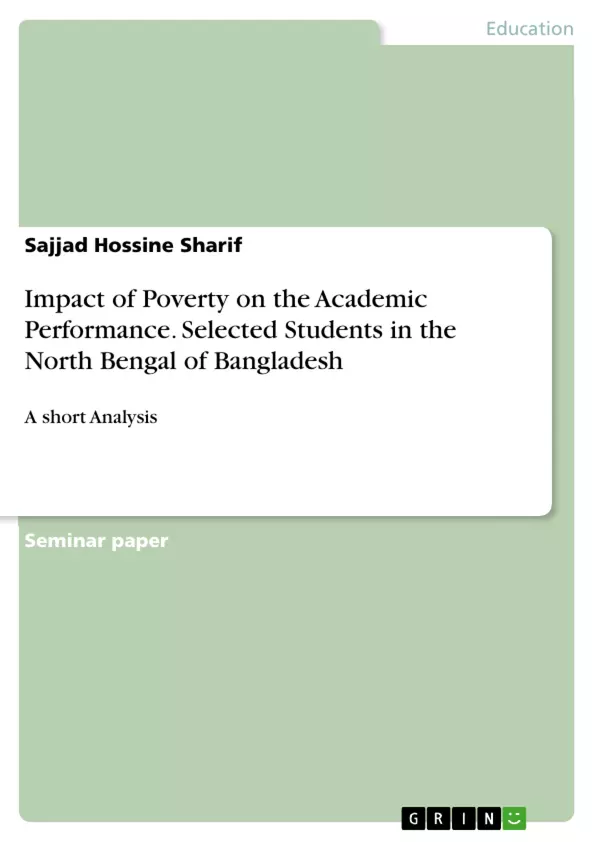The purpose of the study was establishing impact of poverty on the academic performance of school students in Bangladesh. 3 research questions were formulated to guide in the study. The study employed descriptive survey research design while data was collected from websites. Findings revealed that parents were not able to provide their children with learning materials which in turn affected their academic result. It was also found that poor children’s are not privileged with proper environment for education. One of the major findings of the study was that children’s from poor family absent in the class more frequently since they have to get involved with different types of work in home. Inadequate space in home also affect the performance of the students from poor family. 100 Students of four school in Dhaka city were participated in it among them sample of 10 students were selected through convenient sampling. Correlation of their father’s income and their academic performance was run. Based on the findings it was concluded that family’s financial condition has an impact on the children’s academic performance. It was recommend that government should make education free for the students of poor family .Since this study conducted in other countries it was important to identify the impact in Bangladesh.
Table of Contents
- 1. Introduction
- 1.1 Statement of the problem
- 1.2 Purpose of the Study
- 1.3 Research objectives
- 1.4 Research Questions
- 1.5 Significance of the Study
- 1.6 Hypothesis of the Study
- 1.8 Limitations of the Study
- 2. LITERATURE REVIEW
- 2.0 Introduction
- 2.1 Effects of Poverty on Pre-school education
- 2.2 Family poverty and academic achievement
Objectives and Key Themes
This study aims to identify the impact of poverty on the academic performance of school children in Bangladesh. It investigates the factors contributing to low academic achievement, the extent to which parental income influences school participation, and the role of home-related factors in affecting children's performance.
- Impact of poverty on academic performance
- Influence of parental income on children's education
- Role of home environment in academic success
- Correlation between socioeconomic status and educational outcomes
- Policy implications for improving educational access and equity
Chapter Summaries
1. Introduction: This introductory chapter sets the stage for the study by outlining the problem of poverty's impact on academic achievement, particularly focusing on the context of Dinajpur, Bangladesh, where low-income earners are prevalent. It clearly states the study's purpose – to identify the effects of poverty on school children's academic performance – and defines its research objectives and questions. The significance of the study is highlighted, emphasizing its potential to inform government policy on early childhood education and resource allocation. Limitations of the study, such as its geographical restriction to a specific area in Bangladesh and data accessibility issues, are also acknowledged.
2. LITERATURE REVIEW: This chapter provides a comprehensive review of existing literature on the effects of poverty on education. It begins by establishing the fundamental right to education and its importance for human development. The chapter then delves into the effects of poverty on pre-school education, citing research highlighting the self-reinforcing nature of poverty and its impact on children's educational attainment. It explores the association between family poverty and children's academic achievement, examining the influence of the timing, depth, and duration of poverty on various child outcomes. The review uses data from both the US and Canada to underscore the global nature of this issue and the need for more research, particularly in less-studied regions like Bangladesh. This section establishes the theoretical foundation for the study and highlights existing research gaps.
Keywords
Poverty, academic performance, Bangladesh, parental income, home environment, education, socioeconomic status, school achievement, educational equity, policy implications.
Frequently Asked Questions: Impact of Poverty on Academic Performance in Bangladesh
What is the main topic of this study?
This study investigates the impact of poverty on the academic performance of school children in Bangladesh. It examines factors contributing to low academic achievement, the influence of parental income on school participation, and the role of the home environment in affecting children's performance.
What are the key objectives and themes?
The study aims to identify the impact of poverty on academic performance, the influence of parental income on children's education, the role of the home environment in academic success, the correlation between socioeconomic status and educational outcomes, and to explore policy implications for improving educational access and equity.
What does the introduction chapter cover?
The introduction outlines the problem of poverty's impact on academic achievement in Dinajpur, Bangladesh. It states the study's purpose, research objectives, and questions. It highlights the study's significance for informing government policy and acknowledges its limitations (geographical restriction and data accessibility).
What is included in the literature review chapter?
The literature review comprehensively examines existing research on poverty's effects on education. It covers the effects of poverty on pre-school education, the link between family poverty and academic achievement, and uses data from the US and Canada to illustrate the global nature of the issue. It highlights research gaps, particularly in regions like Bangladesh.
What are the chapter summaries provided?
Summaries are provided for the Introduction and Literature Review chapters, outlining the key content and findings of each.
What are the keywords associated with this study?
Poverty, academic performance, Bangladesh, parental income, home environment, education, socioeconomic status, school achievement, educational equity, and policy implications.
What is the overall structure of the document preview?
The preview includes a table of contents, objectives and key themes, chapter summaries, and keywords. It provides a comprehensive overview of the study's content and scope.
Where can I find more information about this study?
The provided preview is an excerpt. For more detailed information, refer to the full study document.
- Citar trabajo
- Sajjad Hossine Sharif (Autor), 2018, Impact of Poverty on the Academic Performance. Selected Students in the North Bengal of Bangladesh, Múnich, GRIN Verlag, https://www.grin.com/document/953696



